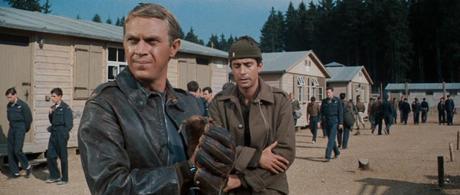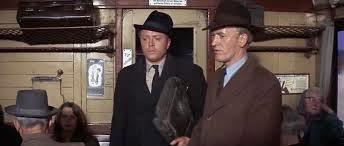 John Sturges built a career on macho ensemble pieces, with The Great Escape (1963) his finest achievement. Its mix of star power and improbable derring-do made it a perennial favorite, turning a real-life tragedy into a thrilling wartime caper.
John Sturges built a career on macho ensemble pieces, with The Great Escape (1963) his finest achievement. Its mix of star power and improbable derring-do made it a perennial favorite, turning a real-life tragedy into a thrilling wartime caper.In 1943, the Luftwaffe houses troublesome Allied airmen in Stalag Luft III. RAF Squadron Leader Bartlett (Richard Attenborough) conceives the audacious plan of breaking out all 250 prisioners in one mass break. Over several months they scrounge supplies, dig tunnels and forge passports and uniforms under the guards' noses. The jailbreak finally goes off, with 76 men escaping: but breaking out proves the easy part. Bartlett and other escapees must still escape Germany with police and the military in hot pursuit.
The Great Escape hews reasonably close to Paul Brickhill's book. Most alterations address box office requirements: the Germans transferred Stalag Luft III's Americans before the escape, yet Steve McQueen gets top-billing. Sturges telescopes various Gestapo executions into a wholesale massacre. But many anecdotes draw from real-life: smuggling dirt in a pants rig, a choir singing to cover sabotage activities, Commandant Von Luger's final scene with Captain Ramsey (James Donald). Among the screenwriters is James Clavell, whose grisly novel King Rat is the anti-Great Escape.
Clocking in at 165 minutes, Escape is never dull despite leisurely pacing. There's no romance and little action until the final act. Truthfully, the early sections play as a lark: our protagonists might as well be at summer camp for all the trouble they encounter. The Germans uncover one tunnel yet take no punitive action; Virgil Hilts (McQueen) escapes repeatedly yet barely gets a slap on the wrist. It's fun watching our heroes scheme and toil, yet these scenes lack the expected suspense.
Then Escape turns much darker in the last forty minutes. Even with uniforms and forged papers, the prisoners fall prey to crafty German agents, bad luck and plain stupidity. The action naturally picks up, but Hilts' joyride and Bartlett's pursuit through a border town prove fleeting exhilaration. The noose tightens, bodies pile up and we're left wondering if the escape was worthwhile. But Sturges abruptly switches back to triumphalism, leaving audiences content with a qualified moral victory. Rarely has failure seemed more exhilarating.
 Presumably learning from The Magnificent Seven's on-set ego battles, Sturges keeps his cast mostly separate. He sketches characters through simple traits and motivations: Hilts refuses to help the escape until a buddy dies; Danny the Pole (Charles Bronson) is claustrophobic; Ives (Angus Lennie) slowly loses his mind. A touching friendship sprouts between "scrounger" Hendley (James Garner) and forger Colin (Donald Pleasance), who's losing his eyesight. The Germans split between honorable Luftwaffe officers and slimy Gestapo interrogators; Hannes Messemer shines as the humane Commandant.
Presumably learning from The Magnificent Seven's on-set ego battles, Sturges keeps his cast mostly separate. He sketches characters through simple traits and motivations: Hilts refuses to help the escape until a buddy dies; Danny the Pole (Charles Bronson) is claustrophobic; Ives (Angus Lennie) slowly loses his mind. A touching friendship sprouts between "scrounger" Hendley (James Garner) and forger Colin (Donald Pleasance), who's losing his eyesight. The Germans split between honorable Luftwaffe officers and slimy Gestapo interrogators; Hannes Messemer shines as the humane Commandant. The British actors do the heavy-lifting. Richard Attenborough plays the nominal protagonist, driven by personal resentment as much as principle. Donald Pleasance plays appealingly against-type as the mild-mannered forger. James Donald (Bridge on the River Kwai) provides the moral center, while Nigel Stock (Victim), David McCallum (Tunes of Glory) and John Leyton (Von Ryan's Express) give strong support. These guys handle the exposition, leaving the Americans to steal scenes.
Steve McQueen gets the choice role, turning his legendary charisma to full blast. He's absent for long stretches of Escape, but nabs the show-stopping set pieces: who else could outrace the entire Germany army on a motorcycle? James Garner plays his usual charming scoundrel, humanized by his scenes with Pleasance. Charles Bronson is a claustrophobic miner; James Coburn makes an unlikely Australian.
The Great Escape proves a reasonable compromise between historical accuracy and thrilling action. Regardless of its more sluggish sections, the infectious, Boys Own appeal is undeniable.
PS: For those interested in learning the true story, Rob Davis's excellent website deserves a look.

